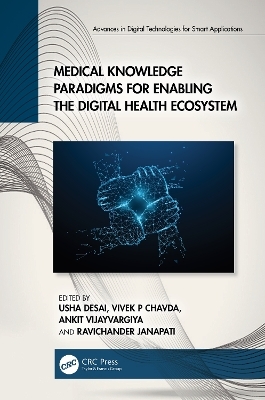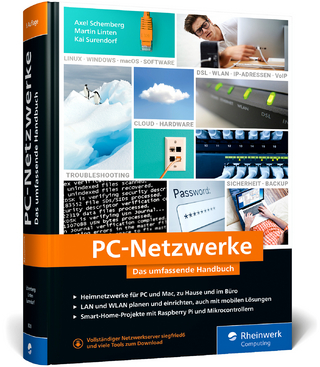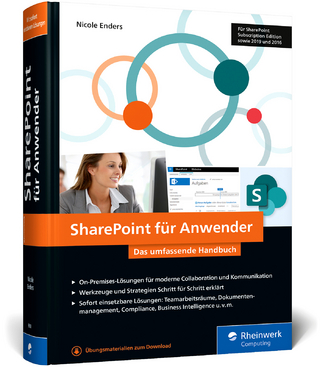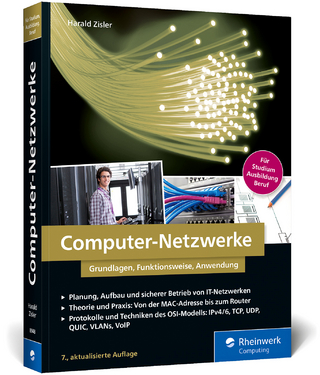
Medical Knowledge Paradigms for Enabling the Digital Health Ecosystem
CRC Press (Verlag)
978-1-032-61193-8 (ISBN)
- Noch nicht erschienen (ca. August 2025)
- Versandkostenfrei innerhalb Deutschlands
- Auch auf Rechnung
- Verfügbarkeit in der Filiale vor Ort prüfen
- Artikel merken
In the era of digital transformation, the landscape of healthcare is undergoing a profound paradigm shift, driven by technological innovation and collaborative endeavors. The book Medical Knowledge Paradigms for Enabling the Digital Health Ecosystem delves into the dynamic interplay between technology and healthcare, exploring the transformative potential of digital solutions in shaping the future of healthcare delivery.
As we embark on this journey through the corridors of medical knowledge, it is imperative to recognize the pivotal role of digital health ecosystems in fostering collaboration, innovation, and accessibility. From pioneering research initiatives to real-world applications, each chapter in this book offers unique insights into the evolving landscape of digital health, reflecting the diverse perspectives and contributions of researchers, practitioners, and stakeholders across the globe.
The book
addresses the necessary comparative study on the mental health well-being for adolescents.
reveals differing levels of awareness regarding WHO’s contributions and cooperation between India and WHO amidst the COVID-19 pandemic.
discusses the remarkable progress across various healthcare domains and highlights the urgent need for enhanced security and efficiency in medical IoT devices, along with the transformative potential of 5G technology in this context.
presents the fusion of artificial intelligence with medical diagnostics, exemplifying techniques like heart disease diagnosis using machine learning, deep learning for skin cancer detection and Hippocampus Sclerosis Segmentation, and COVID-19 diagnosis using self-organizing feature maps.
showcases the journey of revolutionizing prosthetics through brain-computer interface-based 3D printed bionic hands, exemplifying the intersection of technology and human-centric design, ultimately enhancing the quality of life for individuals with disabilities.
delves into the realm of point-of-care diagnostics in laboratory medicine, offering insights into the current scenario and prospects of this critical aspect of healthcare delivery.
Through these chapters, readers will gain a comprehensive understanding of the diverse array of technological innovations reshaping the healthcare landscape and driving forward the agenda of accessible, efficient, and patient-centric healthcare delivery worldwide.
Usha Desai is presently working as a Professor and Dean (Research & Development) for S.E.A. College of Engineering & Technology, Bengaluru. She received her PhD in Biomedical Signal Processing from REVA University, Bengaluru, and M. Tech and BE from Visvesvaraya Technological University, Belagavi, Karnataka. She received the DST International Travel Grant to present her research paper at 39th IEEE EMBS International Annual Conference held at South Korea. She served as Session Chair at the reputed IEEE International Conferences. Also, she has presented papers in many reputed conferences and authored more than 40 research publications. She has authored five books on biomedical healthcare. She has six patents. She is presently a Senior Member of IEEE and Life Member of ISTE. Vivek P. Chavda is Assistant Professor, Department of Pharmaceutics and Pharmaceutical Technology, L M College of Pharmacy, Ahmedabad, Gujarat, India. He is a B Pharm and M Pharm Gold Medalist at Gujarat Technological University. Before joining to academia, he was employed in the biologics industry for almost seven years in the research and development of biologics with two successful regulatory patents at Lupin Biotech (Pune) and Dr. Reddy’s Laboratory (Hyderabad). He has more than 100 national and international publications, 30 book chapters, 10 book chapters under review, 2 patents in the pipeline and numerous newsletter articles to his credit. His research interests include development of biologics process and formulations; medical device development, nano-diagnostics and non-carrier formulations, long-acting parenteral formulations, and nano-vaccines. Ankit Vijayvargiya currently holds the role of Postdoctoral Research Fellow at the Insight SFI Research Centre for Data Analytics, within the School of Human and Health Performance at Dublin City University, Dublin, Ireland. Concurrently, he serves as an Associate Professor in the Department of Electrical Engineering at Swami Keshvanand Institute of Technology, Management & Gramothan, located in Jaipur, India. He also worked as a visiting researcher at Khalifa University, Abu Dhabi, UAE. He is a senior member of IEEE and holds an associate membership with the Institute of Engineers, India. He was honored with the prestigious Marie Skłodowska-Curie Actions scholarship for postdoctoral research. He obtained his PhD in Biomedical Signal Processing from Malaviya National Institute of Technology, Jaipur, India, in 2022. His current research interests encompass a broad spectrum, including biomedical signals, machine learning, healthcare, and human–machine interface. Ravichander Janapati is presently working as an Associate Professor at Department of ECE, SR University, Warangal, Telangana, India. He is a senior member of IEEE, and he graduated in Electronics and Communication Engineering from JNTU Hyderabad. He received his PhD in the Adhoc Wireless Sensor Networks field and M. Tech in Digital Electronics and Communication Systems from the Jawaharlal Nehru Technical University, Anantapur. His research papers are published in reputed international journals and international conferences. He had successfully completed a UGC sponsored project and one project funded by DST-SERB. Interests for research are wireless senor networks and brain computer interface. He is a reviewer for the Adhoc Network journal (Elsevier). He has eight patents.
1. Mental well-being of adolescents: A comparison of day school and boarding school
Usha Desai, M. Susha, K. P. Raghavan
2. Epilepsy signals classification using feature selection and a feature ranking approach
Usha Desai, Roshan J. Martis, Akash Saxena, Dilna Udayan, M. Susha
3. Skin cancer detection in skin lesion images using weighted ensemble-based VGG16 CNN
Rahul Kumar Chaurasiya, Aditi Gupta, Rohit Singh Ahirwar, Abhinandini Borkar, Pradeep Kumar Sahu, Sahil Mourya
4. Hippocampus sclerosis segmentation by vanilla U-Net model prediction
Jayanthi Vajiram, S. Sivakumar, H. G. Nanditha, Chennagiri Rajarao Padma
5. Nanotechnological advancements in medical devices
P. R. Lighittha, M. Sundara Srivathsan, G. Lakshmi Priya
6. A study on enhancing security and efficiency in medical IoT devices data transmission using 5G technology
V. Ramakrishna, S. V. Sudheer Kumar, Ravichander Janapati, Dwarapu Lakshmi Narayana
7. One digital health
Rajashri Bezbaruah, Bedanta Bhattacharjee, K. Sandhanam, Ram Kumar Sahu, Jesa S. Madelo, Pankti C. Balar, Vivek P. Chavda
8. An enhanced approach to predict heart disease for Gen X using machine learning algorithms
R. Akshay, P. Pramod Kumar
9. Innovative supporting system: A primitive model to address nature call challenges for bedridden individuals
Murigendrayya M. Hiremath, Chennagiri Rajarao Padma, A. R. Aswatha, Usha Desai
10. 1D self-organizing feature map technique for diagnosis of COVID-19 infection
Naveen Gehlot, Ankit Vijayvargiya, Rajesh Kumar, Akhil Ranjan Garg, Nilanjan Dey
11. Revolutionizing prosthetics: The journey of BCI-based 3D-printed bionic hands
Thottempudi Pardhu, Usha Desai, Sampath Kumar, Bhagavant K. Deshpande, D. M. Shivanna
12. Point-of-care diagnostics in laboratory medicine: The current scenario and future prospects
Arindam Ghosh, Aritri Bir, Dipmala Das, Asitava Deb Roy
13. Public awareness on healthcare ecosystem and cooperation between India and the World Health Organization
D. Ramesh Babu, Gurunadham Goli, Rakesh Sengupta, Usha Desai, Michael Jackson,
K. V. Narasimha Rao, P. Issac Prasad
14. Applications of nanotechnological medical devices: Nanosensors, nanomaterials, nanomedicine
Amol D. Gholap, Pankaj R. Khuspe, Satish Rojekar, Sadikali F. Sayyad, Machindra Chavan
15. Roadmap for near-patient diagnostics techniques in healthcare
Suneetha Vuppu, Toshika Mishra, Keshav Sharma, Tejasri Sirigiri, Sanhita Pathak, V. Raj, Vivek P. Chavda
| Erscheint lt. Verlag | 30.8.2025 |
|---|---|
| Reihe/Serie | Advances in Digital Technologies for Smart Applications |
| Zusatzinfo | 19 Tables, black and white; 53 Line drawings, black and white; 47 Halftones, black and white; 100 Illustrations, black and white |
| Verlagsort | London |
| Sprache | englisch |
| Maße | 156 x 234 mm |
| Themenwelt | Mathematik / Informatik ► Informatik ► Netzwerke |
| Mathematik / Informatik ► Informatik ► Theorie / Studium | |
| Medizin / Pharmazie ► Physiotherapie / Ergotherapie ► Orthopädie | |
| Recht / Steuern ► EU / Internationales Recht | |
| Recht / Steuern ► Privatrecht / Bürgerliches Recht ► IT-Recht | |
| Recht / Steuern ► Privatrecht / Bürgerliches Recht ► Medizinrecht | |
| Technik ► Medizintechnik | |
| Wirtschaft ► Volkswirtschaftslehre | |
| ISBN-10 | 1-032-61193-6 / 1032611936 |
| ISBN-13 | 978-1-032-61193-8 / 9781032611938 |
| Zustand | Neuware |
| Informationen gemäß Produktsicherheitsverordnung (GPSR) | |
| Haben Sie eine Frage zum Produkt? |
aus dem Bereich


